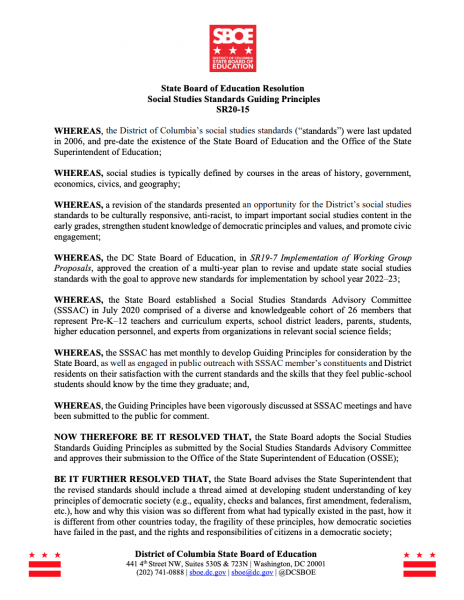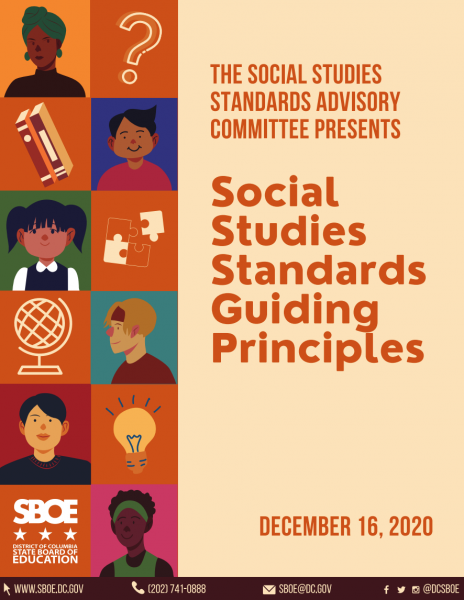Status Update as of 6/21/23:On June 21, 2023, the State Board voted unanimously to approve the revised social studies standards for the District of Columbia. Read the resolution and approved standards. The new statewide standards are slated to be implemented starting in school year 2024–25 in District public schools. Learn more here about OSSE's plan for implementation support. |
Why Revise D.C.’s Social Studies Standards?
The current social studies standards in D.C. were last revised in 2006. The standards pre-date the existence of both the Office of the State Superintendent of Education (OSSE) and the State Board of Education. While the current standards feature strengths--covering a wide range of topics, a revision is long overdue. The revision process presents an opportunity for the District’s social studies standards to be culturally responsive, anti-racist, to impart important social studies content in the early grades, strengthen student knowledge of democratic principles and values, and promote civic engagement.
How to Keep Track of the Revision Process:
The State Board will regularly update this web page to document progress. Members of the public and Advisory Committee members can find all related documents on our shared Google Drive folder. In general, upcoming live streams and video archives can be found on the DCSBOE official YouTube Channel. Meeting archives can also be found on Simbli.
SSSAC Shared Drive SBOE YouTube Channel
Additionally, the table below is intended to detail all aspects of the revision process and to organize them in a user-friendly manner.
- Process Overview (Tab 1) – An overview of the phases of the revision process, which was presented by OSSE at the April 2020 working session.
- Key Stakeholders (Tab 2) – List of all of the stakeholders, roles, and descriptions involved in the revision process.
- Timeline (Tab 3) – List of every action that pertains to the revision process, from resolutions passed to meetings and panels, including links to all corresponding relevant documents, agendas, minutes, and meeting videos.
- List of Advisory Committee Members (Tab 4) – List of the Social Studies Standards Advisory Committee members.
Advisory Committee
The State Board, in partnership with the Office of the State Superintendent of Education (OSSE), began its review and update of the District’s statewide social studies standards in July 2020. To conduct this substantive review, the State Board convened a Social Studies Standards Advisory Committee. The Advisory Committee is responsible for drafting guiding principles and making recommendations to the State Board and to OSSE on how the state standards should be revised and updated to reflect the needs of students and teachers in the District.
To reach our goal of revised standards that better serve our District, diversity was a vital component of our selection process, ensuring that this Advisory Committee is reflective of the schools and residents of each ward, as well as the expertise of both school-based and non-school based individuals. The State Board opened the application for the Advisory Committee during its May 20 public meeting—with applications being accepted for 3.5 weeks. The State Board solicited applications through all of our social media channels, individual email blasts to all public school principals, local ANC representatives, and constituents of all 8 wards. The State Board also extended the application deadline from June 12 to June 15 to ensure equity of applicants and that all applicants had ample time to complete and submit their applications.
After receiving over 100 applications, the members of the State Board conducted a blind, anonymous review of all applications. The State Board convened following this blind, anonymous review to discuss top scoring applicants— where diversity of membership (ward of residence and work, race, ethnicity, gender) and representative voice (parent, teacher, student, expert) were all factors that were considered when developing the final selection process and Advisory Committee make-up.
The State Board has selected a diverse and knowledgeable cohort of 26 members that represent Pre-K–12 teachers and curriculum experts, school district leaders, parents, students, higher education personnel, and experts from organizations in relevant social science fields. In keeping with SBOE's commitment to transparency, all applications for the Advisory Committee are open to public review. The original application can be found here.
We are honored to announce the members of the Social Studies Standards Advisory Committee:
| Name | School, Organization or Position |
| Alexander O'Sullivan | BASIS DC PCS, Student |
| Alyssa Richardson | Duke Ellington School of the Arts, Student |
| Barbara Davidson | StandardsWork, Inc., President |
| Daniel Espinas | DCPS, Teacher |
| Elizabeth A. Worden, PhD | American University, Associate Professor |
| Emily Brimsek | National Center on Education and the Economy, Manager, Professional Learning |
| Fadhal Moore | Georgetown University, MPP Candidate |
| Jennifer DePaoli | Learning Policy Institute, Senior Researcher |
| Jessica A. Rucker | EL Haynes High School PCS, Teacher |
| Karen Hopkins | Human Rights Educators USA, DC Area Representative |
| Karen Lee | Thurgood Marshall Academy PCS, Teacher |
| Lamar James Bethea | Statesmen College Preparatory Academy, Teacher |
| Laura Fuchs | HD Woodson High School, Teacher |
| Lauren Grimes | The Community Enrichment Project, Founder |
| Maria Marable-Bunch | National Museum of the American Indian, Smithsonian Institution, Associate Director for Museum Learning and Programs |
| Melanie R. Holmes | MacFarland Middle School, Teacher |
| Michael Stevens | Friendship PCS, Director of Social Studies |
| Molly France | Two Rivers PCS, Instructional Guide |
| Molly Sloss | Capitol Hill Montessori School, Teacher |
| Nicolas Ojeda | Duke Ellington School of the Arts, Teacher |
| Rebecca Schouvieller | DC International School PCS, Teacher |
| Reginald L. Williams | Benjamin Banneker Academic High School, Social Studies Teacher |
| Sally Schwartz | Globalize DC, Executive Director |
| Sarah Buscher | Janney Elementary School, Teacher |
| Scott Abbott | DCPS, Office of Teaching and Learning, Director of Social Studies |
| Shelina Warren | Dunbar High School, Teacher |
Social Studies Standards Guiding Principles
The initial work of the Advisory Committee included soliciting public input on social studies in the District and drafting 19 guiding principles. The guiding principles make recommendations to the State Board and OSSE on how the state standards should be revised and updated to reflect the needs of students and teachers in the District. The guiding principles were distributed for public comment in November 2020, and then presented and voted on at the State Board’s December 2020 public meeting in SR20-15. The final set of Guiding Principles can be found here.
Left: SR20-15, the resolution that approved the Guiding Principles, Right: the final version of the Guiding Principles
Key themes include:
- Fewer, higher, clearer, rigorous standards that will be coherent, developmentally appropriate and vertically aligned across grades Pre-K–12.
- Expansion on the types of skills and knowledge to which all D.C. students should be guaranteed access (e.g., digital literacy, student agency, democratic citizenship, power and bias).
- Recognition that the world our students are growing up in is—more than ever before—globally interconnected and culturally and racially diverse.
Additional work of the Advisory Committee will continue on an ad-hoc basis so that new statewide standards may be implemented by school year 2023–24 in District public schools.
Technical Writing Committee
In February 2021, OSSE launched the DC Social Studies Standards Technical Writing Committee, which is charged with the review and revision of the social studies standards. They will submit a revised draft to OSSE and the State Board will vote on them before the end of 2022.
The writing committee is comprised of K-12 social studies educators from DC Public Schools (DCPS) and public charter schools, as well as local and national technical experts in social studies. The work of the writing committee will be grounded in the Advisory Committee’s Social Studies Standards Guiding Principles. Learn more about the work of the Technical Writing Committee on OSSE's website.
| Name | School, Organization or Position |
| Aaron Bruewer, Ph.D. | University of the District of Columbia (UDC), Assistant Professor of Education |
| Adrienne Glasgow | Dunbar High School, Educator |
| Alexus McIntyre | Alice Deal Middle School, Educator |
| Alexis Mays-Fields | Center City PCS, Educator |
| Alysha Butler | McKinley Technology High School, Educator |
| Anthony Hiller | DCPS, Office of Teaching and Learning |
| Ashia Caraway | Capital City PCS, Educator |
| Ashley Chu | Center City PCS, Educator |
| Brian C. Morrison, Ph.D. | Ballou High School, Educator |
| Cosby Hunt | Thurgood Marshall Academy PCS, Educator; UDC, Adjunct Professor |
| Daniel Kohn | Paul PCS, Instructional Coach for Social Studies |
| Demetria Clark | Anne Beers Elementary School, Educator |
| Elleni Abebe | Roosevelt High School, Educator |
| Emily Brimsek, Ph.D. | National Center on Education and the Economy |
| Heber Diaz | Columbia Heights Education Campus, Educator |
| Kimberly F. Monroe, Ph.D. | Trinity Washington University, Professor |
| Lelac Almagor | DC Bilingual PCS, Educator |
| Lindsay Bell McCrea | DCPS, Office of Teaching and Learning |
| Madison Kantzer | DCPS, Office of Teaching and Learning |
| Megan E Patterson | Center City PCS, Educator |
| Melanie R. Holmes | MacFarland Middle School, Instructional Coach |
| Michael Stevens | Friendship PCS, Director of Social Studies |
| Michelle Leonor | MacFarland Middle School, Educator |
| Natalie Stapert | Lowell School, Curriculum Coordinator & Educator |
| Rebecca Schouvieller | DC International School PCS, Educator |
| Rob Manuel | KIPP DC: College Preparatory High School, Educator & Instructional Coach |
| Sarah Buscher | Janney Elementary School, Educator |
| William McMurtrey | Ballou STAY High School, Educator |
| Yaniq Walford | KIPP DC PCS, Educator |
| Zo Clement | Two Rivers PCS, Educator |
Attachments:
- 2020-04-01 Social Studies Standards Plan OSSE Presentation.pdf
- Application - Social Studies Standards Advisory Committee (2020-21) - Google Forms.pdf
- 2020-06-15-SSSAC Application (Public Review).pdf
- 2020-12-16-FINAL-SSSAC-Guiding-Principles.pdf
- SR20-15 Social Studies Standards Guiding Principles SIGNED.pdf
- 2022-12-16 OSSE Draft Social Studies Standards
- 2023-02-16 State Board Public Comment Letter on the Draft Social Studies Standards
- 2023-03-29 OSSE Revised Draft Social Studies Standards
- 2023-05-09 State Board Letter to OSSE with a Summary of Public Feedback & Comments on Revised Draft Social Studies Standards


